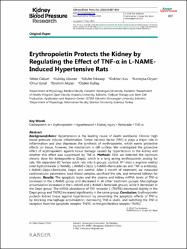Erythropoietin Protects the Kidney by Regulating the Effect of TNF-alpha in L-NAME-Induced Hypertensive Rats

View/
Access
info:eu-repo/semantics/openAccessDate
2018Author
Özkurt, MeteUzuner, Kubilay
Erkasap, Nilüfer
Kuş, Gökhan
Özyurt, Rumeysa
Uysal, Onur
Kutlay, Özden
Metadata
Show full item recordAbstract
Background/Aims: Hypertension is the leading cause of death worldwide. Chronic high blood pressure induces inflammation. Tumor necrosis factor (TNF)-alpha plays a major role in inflammation and also depresses the synthesis of erythropoietin, which exerts protective effects on tissue; however, the mechanism is still unclear. We investigated the protective effect of erythropoietin against tissue damage caused by hypertension in the kidney and whether this effect was suppressed by TNF-alpha. Methods: First, we detected the optimum chronic dose for darbepoetin-alpha (Depo), which is a long-acting erythropoietin analog for rats. We separated 60 female adult rats into 6 groups: control, AP-nitro-L-arginine methyl ester hydrochloride (L-NAME), L-NAME+Depo, L-NAME+Remicade (an anti-TNF-alpha antibody), L-NAME+Depo+Remicade, Depo, and control. After 1 month of treatment, we measured cardiovascular parameters, took blood samples, sacrificed the rats, and removed kidneys for analyses. Results: The apoptotic index and the plasma and kidney mRNA levels of TNF-alpha increased in the L-NAME group and decreased in all other treatment groups. Macrophage accumulation increased in the L-NAME and L-NAME+Remicade groups, while it decreased in the Depo group. The mRNA abundance of TNF receptor 1 (TNFR1) decreased slightly in the Depo group and TNFR2 increased significantly in the same group. Conclusion: Erythropoietin protects kidney tissue against hypertension by preventing the apoptotic effects of TNF-alpha by blocking macrophage accumulation, decreasing TNF-alpha levels, and switching the TNF-alpha receptors from the apoptotic receptor TNFR1 to the proliferative receptor TNFR2

















